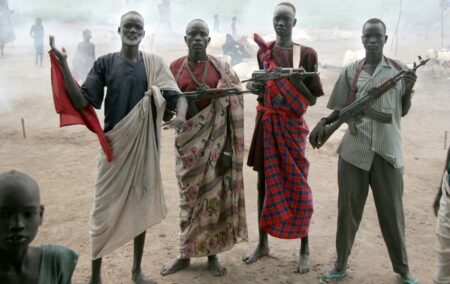The BBC has recently featured “Sudan the Forgotten War” on both their radio and TV platforms, highlighting a conflict that has been raging for over a year.
In April this year, Paris hosted the International Humanitarian Conference for Sudan and neighbouring countries, drawing attention to the ongoing crisis. The conflict in Sudan, rooted in tensions between Arab herders and non-Arab farmers over land, resources, and political power, has led to over 2 million refugees fleeing to neighbouring countries.
The conference condemned the violence, including ethnic attacks, indiscriminate bombings, and gender-based violence, particularly against women and children, describing the situation as the worst child displacement crisis globally, highlighting that the war in Sudan has triggered the world’s most severe humanitarian crisis this year. The head of the UNHCR for the region reported shocking accounts of widespread rape and sexual violence.
UN Women responded to the Sudanese conflict, in stark contrast to their silence on the gender-based and sexual violations faced by Israeli women victims on 7 October. The organisation issued a statement titled “A Year of Suffering for Sudanese Women and Girls,” calling on the international community to ensure that the conflict in Sudan does not become a neglected crisis.
Sudanese women and girls face heightened risks of gender-based violence, with widespread and increasing reports of sexual exploitation, abuse, and trafficking.
Again, UN Women “stands with the people of Sudan during this difficult time” yet remains mum on the plight of Israeli hostages, some of whom may be about to give birth after being raped and sexually assaulted almost nine months ago.
Millions in Sudan face disaster as the Rapid Support Forces (RSF), a paramilitary group that has been fighting the Sudanese Armed Forces (SAF), are accused of using food access as a weapon in the ongoing war. It’s worth noting that within days of accusing Israel of genocide in the International Court of Justice, President Ramaphosa proudly hosts the mass murderer, Mohamed Hamdan Dagalo (aka Hemedti leader of RSF), at his Pretoria residence.
Famine
Sudan is facing a potential famine worse than any the world witnessed in Ethiopia 40 years ago, according to the UN. Aid deliveries continue to be blocked by the warring armies, though arms supplies to both sides flow in.
With much of the world’s attention focused on Gaza, Sudan, already the worst humanitarian crisis globally, is slipping towards a disaster of historic proportions, with minimal media coverage and global concern. A UN humanitarian appeal for the country has received only 16% of the funds it needs.
The UNHCR, together with the Egyptian government, estimates that more than 500,000 people have fled from Sudan to Egypt since hostilities began, and are in need of international support.
In response, the UNHCR and other NGOs, in collaboration with the Egyptian government, are working to support those fleeing Sudan. The UNHCR is coordinating a response to address the needs of those crossing into Egypt. Egypt, being a signatory to International Refugee Conventions and Protocols, is fulfilling these obligations and providing life-saving assistance for those fleeing the war on its southern border, as it did by hosting its brother Arab refugees fleeing the carnage of the Syrian civil war.
The question therefore must be asked why Egypt refuses to extend the same humanitarian relief to its southern neighbours who share a common language, religion, and culture.
Ignored by the media
Historically, this territory was part of a larger cultural and political entity under Egyptian influence, yet today, the border is strictly reinforced and sealed, preventing any refugees from crossing into Egypt. Again, this crisis is being ignored by the media.
Egypt’s decision to seal its border with Gaza is largely driven by concerns over Hamas’s strong ties with the Muslim Brotherhood. President Sisi and the military view the Muslim Brotherhood as an Islamist organization with a fundamentally different ideology from their secular nationalist stance.
They fear that the Brotherhood could gain power and potentially alter the secular nature of the Egyptian state. This fear has led to strict measures, including the closure of the Gaza border, to prevent any potential influence or power consolidation by the Brotherhood.
[Image: Randy Fath on Unsplash]
The views of the writer are not necessarily the views of the Daily Friend or the IRR
If you like what you have just read, support the Daily Friend

